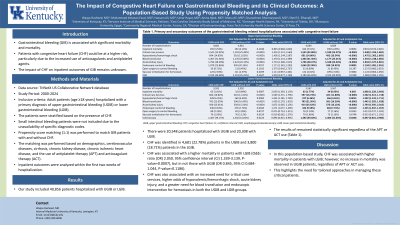Monday Poster Session
Category: GI Bleeding
P2460 - The Impact of Congestive Heart Failure on Gastrointestinal Bleeding and Its Clinical Outcomes: A Population-Based Study Using Propensity Matched Analysis
Monday, October 28, 2024
10:30 AM - 4:00 PM ET
Location: Exhibit Hall E

Has Audio

Waqas Rasheed, MD
University of Kentucky
Lexington, KY
Presenting Author(s)
Waqas Rasheed, MD1, Muhammad Imtanan Fazal, MD2, Hassam Ali, MD3, Umar Hayat, MD4, Amna Iqbal, MD5, Mona A.. Ali, MD6, Gnanashree Dharmarpandi, MD7, Sherif E.. Elhanafi, MD8
1University of Kentucky, Lexington, KY; 2Services Institute of Medical Sciences, Lahore, Punjab, Pakistan; 3East Carolina University Brody School of Medicine, Greenville, NC; 4Geisinger Wyoming Valley Medical Center, Wilkes-Barre, PA; 5University of Toledo Medical Center, Toledo, OH; 6Mansoura University, Mansoura, Ad Daqahliyah, Egypt; 7Texas Tech University Health Sciences Center, Amarillo, TX; 8Texas Tech University Health Sciences Center, El Paso, TX
Introduction: Gastrointestinal bleeding (GIB) is a significant cause of hospitalization in the US. Patients with congestive heart failure (CHF) could be at a higher risk, particularly due to the increased use of anticoagulants and antiplatelet agents. However, the impact of CHF on inpatient outcomes of GIB remains unknown.
Methods: The data were sourced from the TriNetX US Collaborative Network database (2000-2024). Adult patients (age ≥18 years) hospitalized with a primary diagnosis of upper gastrointestinal bleeding (UGIB) or lower gastrointestinal bleeding (LGIB) were included. The patients were stratified based on the presence of CHF. Small intestinal bleeding patients were not included in this study due to the unavailability of specific diagnostic codes. Propensity score matching (1:1) was performed to match the patients with CHF to those without CHF. The matching was based on demographics, cerebrovascular diseases, cirrhosis, chronic kidney disease, chronic ischemic heart disease, and the use of antiplatelet therapy (APT) and anticoagulant therapy (ACT). The outcomes were analyzed within the first two weeks of hospitalization to enhance the likelihood of capturing inpatient results.
Results: A total of 40,856 patients were identified. Patients with UGIB were 20,548, and those with LGIB were 20,308. CHF was identified in 4,681 (22.78%) patients in the UGIB group and 3,800 (18.71%) patients in the LGIB group. In the UGIB cohort, there was no significant increase in mortality in the CHF cohort compared to the non-CHF cohort (Odds ratio (OR) 0.845, 95% confidence interval (CI) 0.684-1.044, P-value=0.1186). However, in the LGIB group, the CHF cohort was noted to have higher mortality compared to the non-CHF cohort (OR=2.050, 95% CI 1.339-3.139, P-value=0.0007). Additionally, the presence of CHF was associated with an increased need for critical care services, higher odds of hypovolemic/hemorrhagic shock, acute kidney injury, and a greater need for blood transfusion and endoscopic intervention for hemostasis in both the UGIB and LGIB groups (Table 1). The results remained statistically significant with and without adjustment for the use of APT and ACT.
Discussion: In this population-based study, CHF was associated with higher mortality in patients with LGIB; however, no increase in mortality was observed in UGIB patients, regardless of APT or ACT use. This highlights the need for tailored approaches in managing these critical patients.
Note: The table for this abstract can be viewed in the ePoster Gallery section of the ACG 2024 ePoster Site or in The American Journal of Gastroenterology's abstract supplement issue, both of which will be available starting October 27, 2024.
Disclosures:
Waqas Rasheed, MD1, Muhammad Imtanan Fazal, MD2, Hassam Ali, MD3, Umar Hayat, MD4, Amna Iqbal, MD5, Mona A.. Ali, MD6, Gnanashree Dharmarpandi, MD7, Sherif E.. Elhanafi, MD8. P2460 - The Impact of Congestive Heart Failure on Gastrointestinal Bleeding and Its Clinical Outcomes: A Population-Based Study Using Propensity Matched Analysis, ACG 2024 Annual Scientific Meeting Abstracts. Philadelphia, PA: American College of Gastroenterology.
1University of Kentucky, Lexington, KY; 2Services Institute of Medical Sciences, Lahore, Punjab, Pakistan; 3East Carolina University Brody School of Medicine, Greenville, NC; 4Geisinger Wyoming Valley Medical Center, Wilkes-Barre, PA; 5University of Toledo Medical Center, Toledo, OH; 6Mansoura University, Mansoura, Ad Daqahliyah, Egypt; 7Texas Tech University Health Sciences Center, Amarillo, TX; 8Texas Tech University Health Sciences Center, El Paso, TX
Introduction: Gastrointestinal bleeding (GIB) is a significant cause of hospitalization in the US. Patients with congestive heart failure (CHF) could be at a higher risk, particularly due to the increased use of anticoagulants and antiplatelet agents. However, the impact of CHF on inpatient outcomes of GIB remains unknown.
Methods: The data were sourced from the TriNetX US Collaborative Network database (2000-2024). Adult patients (age ≥18 years) hospitalized with a primary diagnosis of upper gastrointestinal bleeding (UGIB) or lower gastrointestinal bleeding (LGIB) were included. The patients were stratified based on the presence of CHF. Small intestinal bleeding patients were not included in this study due to the unavailability of specific diagnostic codes. Propensity score matching (1:1) was performed to match the patients with CHF to those without CHF. The matching was based on demographics, cerebrovascular diseases, cirrhosis, chronic kidney disease, chronic ischemic heart disease, and the use of antiplatelet therapy (APT) and anticoagulant therapy (ACT). The outcomes were analyzed within the first two weeks of hospitalization to enhance the likelihood of capturing inpatient results.
Results: A total of 40,856 patients were identified. Patients with UGIB were 20,548, and those with LGIB were 20,308. CHF was identified in 4,681 (22.78%) patients in the UGIB group and 3,800 (18.71%) patients in the LGIB group. In the UGIB cohort, there was no significant increase in mortality in the CHF cohort compared to the non-CHF cohort (Odds ratio (OR) 0.845, 95% confidence interval (CI) 0.684-1.044, P-value=0.1186). However, in the LGIB group, the CHF cohort was noted to have higher mortality compared to the non-CHF cohort (OR=2.050, 95% CI 1.339-3.139, P-value=0.0007). Additionally, the presence of CHF was associated with an increased need for critical care services, higher odds of hypovolemic/hemorrhagic shock, acute kidney injury, and a greater need for blood transfusion and endoscopic intervention for hemostasis in both the UGIB and LGIB groups (Table 1). The results remained statistically significant with and without adjustment for the use of APT and ACT.
Discussion: In this population-based study, CHF was associated with higher mortality in patients with LGIB; however, no increase in mortality was observed in UGIB patients, regardless of APT or ACT use. This highlights the need for tailored approaches in managing these critical patients.
Note: The table for this abstract can be viewed in the ePoster Gallery section of the ACG 2024 ePoster Site or in The American Journal of Gastroenterology's abstract supplement issue, both of which will be available starting October 27, 2024.
Disclosures:
Waqas Rasheed indicated no relevant financial relationships.
Muhammad Imtanan Fazal indicated no relevant financial relationships.
Hassam Ali indicated no relevant financial relationships.
Umar Hayat indicated no relevant financial relationships.
Amna Iqbal indicated no relevant financial relationships.
Mona Ali indicated no relevant financial relationships.
Gnanashree Dharmarpandi indicated no relevant financial relationships.
Sherif Elhanafi indicated no relevant financial relationships.
Waqas Rasheed, MD1, Muhammad Imtanan Fazal, MD2, Hassam Ali, MD3, Umar Hayat, MD4, Amna Iqbal, MD5, Mona A.. Ali, MD6, Gnanashree Dharmarpandi, MD7, Sherif E.. Elhanafi, MD8. P2460 - The Impact of Congestive Heart Failure on Gastrointestinal Bleeding and Its Clinical Outcomes: A Population-Based Study Using Propensity Matched Analysis, ACG 2024 Annual Scientific Meeting Abstracts. Philadelphia, PA: American College of Gastroenterology.
